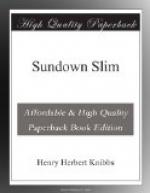The sun was high when he arrived at the wagon-road above the Concho. Dazed and weak, he endeavored to determine which direction the horse had taken. The heat of the sun oppressed him. He became faint, and, crawling beneath the shade of a wayside fir, he rested, promising himself that he would, when the afternoon shadows drifted across the road, make his way to the Concho. He had slept little more than an hour when the swift patter of hoofs wakened him. As he got to his feet, a buckboard, drawn by a pair of pinto range-ponies, drew up. Corliss started back. The Mexican driving the ponies turned toward the sweet-faced Spanish woman beside him as though questioning her pleasure. She spoke in quick, low accents. He cramped the wagon and she stepped to the road. The Senora Loring, albeit having knowledge of his recent return to Antelope, his drinking, and all the unsavory rumors connected with his return, greeted Corliss as a mother greets a wayward son. She set all this knowledge aside and spoke to him with the placid wisdom of her years and nature. Her gentle solicitude touched him. She had been his foster-mother in those years that he and his brother had known no other fostering hand than that of old Hi Wingle, the cook, whose efforts to “raise” the Corliss boys were more largely faithful than discriminating.
Senora Loring knew at a glance that he was in trouble of some kind. She asked no questions, but held out her hands.
Corliss, blind with tears, dropped to his knee: “Madre! Madre!” he cried.
She patted his head. “You come with me. Then perhaps you have to say to me that which now you do not say.”
He shook his head, but she paid no attention, leading the way to the buckboard. He climbed beside the driver, then with an ejaculation of apology, leaped to the road and helped her in.
“Where you would like to go?” she asked. “The Concho?”
Again he shook his head. “I can’t. I—”
She questioned his hesitation with her eyes.
“I’ll tell you when—when I feel better. Madre, I’m sick.”
“I know,” she said.
Then, turning to the driver, she gestured down the wagon-trail.
They drove through the morning woodlands, swung to the east, and crossed the ford. The clustered adobes of the Loring homestead glimmered in the sun. Corliss glanced across the river toward the Concho. Again the Senora Loring questioned him with a glance.
He shook his head. “Away—anywhere,” he said, gesturing toward the horizon.
“You come home with me,” she said quietly. “Nellie is not at the home to-day. You rest, and then perhaps you go to the Concho.”
As they entered the gateway of the Loring rancho, Corliss made as though to dismount. The Senora Loring touched his arm. He shrugged his shoulders; then gazed ahead at the peaceful habitation of the old sheep-herder.




